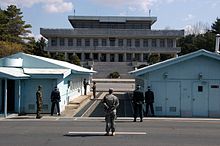This article includes a list of general references, but it lacks sufficient corresponding inline citations. (September 2019) |
This article may require copy editing for erroneous use of punctuation and numerous grammatical mistakes. (July 2024) |


South Korea has a relatively unified and integrated approach to law enforcement. For example, the National Police Agency (NPA) provides all general policing services throughout the country. Due to the unitary system, local police organizations are directly under the NPA.
This differs from the situation in many countries such as France, where policing is split between the National Police and Gendarmerie, or the United States, which has a layered system of national, state/regional, and/or local law enforcement organizations.
However, South Korea has several independent agencies that only enforce a specific law or laws—for example, the Ministry of Justice and Ministry of Economy and Finance have their own enforcement organizations for either border control, Customs or taxation, respectively. However, they are not formally called police.
The Police of the Republic of Korea' (the National Police Agency of the Republic of Korea) protect Republic of Korea people's lives, bodies and property, prevent, suppress, and investigate crimes, guard major facilities, guard key factors, and counter-espionage. Conducting counterterrorism operations, collecting, preparing, and distributing security information, controlling traffic and preventing harm, seeking international cooperation with foreign government agencies and international organizations, and other duties to maintain public peace and order[1] It refers to an organization in charge of security, safety, pollution control, and investigation of incidents at sea.[2]